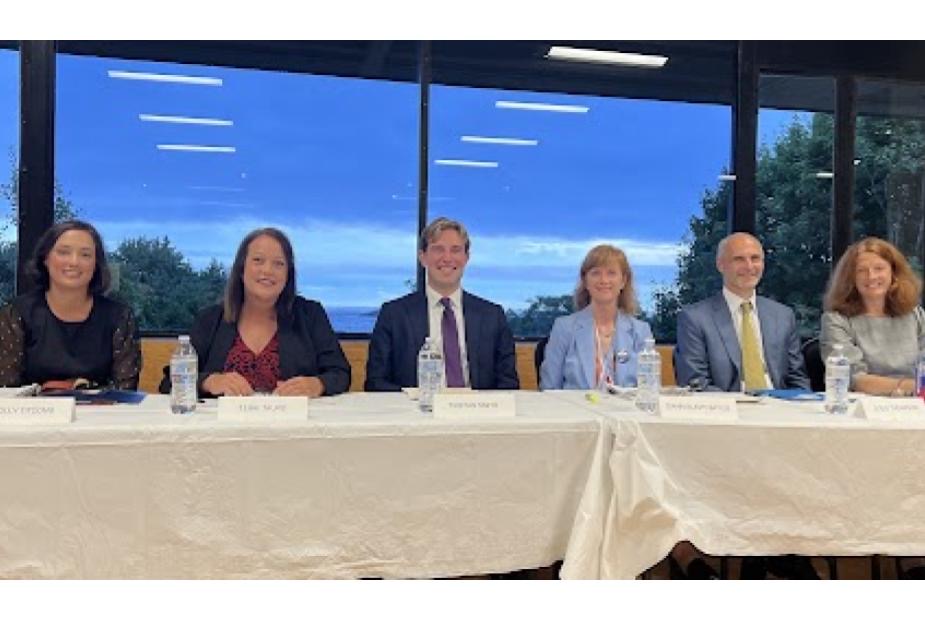Titcomb: "Checks and Balances Are Critical" in Government
Editor’s Note: Each of the six candidates for State Representative of the 8th Essex District sat down for a conversation with Marblehead Beacon. Last week, we covered Polly Titcomb’s personal and professional background. This week, we are focusing on some issues she finds most relevant to her campaign.
Affordable Housing and Public Transportation
Titcomb believes firmly that in order to have the communities of the 8th Essex District thrive and grow, there must be adequate affordable housing. She explains that while development cannot be mandated, when there is development and when towns adopt bylaws requiring a certain amount of affordable housing within a reasonable radius of public transportation, “that’s a good thing.” Public transportation, though, also must be affordable. “The train is as expensive–maintenance aside–as a car,” she notes, adding that in her own life, “it was a financial line in my family budget and is an insane expense.” Buses are significantly less expensive, she acknowledges, but she would like to see trains become more financially accessible.
Titcomb believes that funding housing authorities might be a more optimal approach than simply looking to incentivize developers to add more buildings with a certain percentage deemed affordable. In fact, creating affordable housing for the incentives “can be a developer tactic as opposed to an investment in public and affordable housing, and that’s problematic. It’s not an either-or though,” Titcomb says, focusing on the idea of making the most of public housing space, turning two stories into four, for example, and recognizing that particularly with small, historic towns, there are limits to space that can or should be developed. “Surely we can be more creative,” she says.
One-Party Rule
Asked whether she sees any checks-and-balances issues with a legislature that has for decades been overwhelmingly composed of Democrats, Titcomb believes the answer is much more layered than a “yes” or a “no.” “That question begs a lot of other questions about imbalance in government representation and an overall lack of communication about issue-focused communication versus value-focused communication,” says Titcomb. In her family law practice, she spends time as a mediator. “One of the cornerstones of mediation is getting people off their positions and into their values. The only way people come to consensus is by identifying sufficient values to come to an agreeable compromise, and not a compromise so watered-down it becomes a nothing.” She does, however, express concern about “the perception or the actual reality that no [Republicans’] values have been reflected and they’re totally disappointed and their representative wouldn’t even bother talking to them, and that they may not even pay attention to state-level government because it’s all Democrats–yes, that’s a problem.”
Independent Research Bureau and Transparency
In a related matter, Titcomb raises something that she believes poses a significant impediment to legislating with care: not having an independent research bureau. “Massachusetts is the only state in the country that does not have an established and funded legislative research service bureau,” she says, which is necessary to provide “comprehensive and objective research reports conducted by neutral third-party professionals regarding a particular issue.” She goes on to say, “It boggles my mind why legislators wouldn’t fund” such a bureau.
In general, Titcomb believes that having structures in place designed to outlast any individual legislators is paramount to making State House work “corruption proof.” To that end, she’d like to see legislators follow a set of rules that ensure things are “business, not personal,” and above all, transparent. “The failure to record the votes of individual legislators on the floor and in committee (with the exception of roll-calls) is a miscarriage of justice for constituents and the inaccessibility of committee reports is similarly disturbing,” she says on her campaign website. Additionally, the fact that any Speaker of the House has singular power to determine who is appointed to coveted committees, in Titcomb’s opinion, can cause a chilling effect on how legislators vote. This can make legislators to use their votes to appease the Speaker, which does not align with Titcomb’s goals of transparency and working for the people of the Commonwealth. “In any form of government, in all aspects of government, checks and balances are critical to proper functioning and protecting against operating in self interest.”
Titcomb’s campaign website may be found here.
Editor’s Note: The author of this story, Lena Robinson, and her family have been close to one of Titcomb’s opponents–Jenny Armini–and her family for more than 25 years. Robinson’s husband, Dwight Robson, has donated to Armini's campaign. Marblehead Beacon co-founder Jenn Schaeffner is on the steering committee of the group PowerUP!, on which Terri Tauro serves. Prior to launching Marblehead Beacon, Schaeffner contributed to Tauro's campaign.









